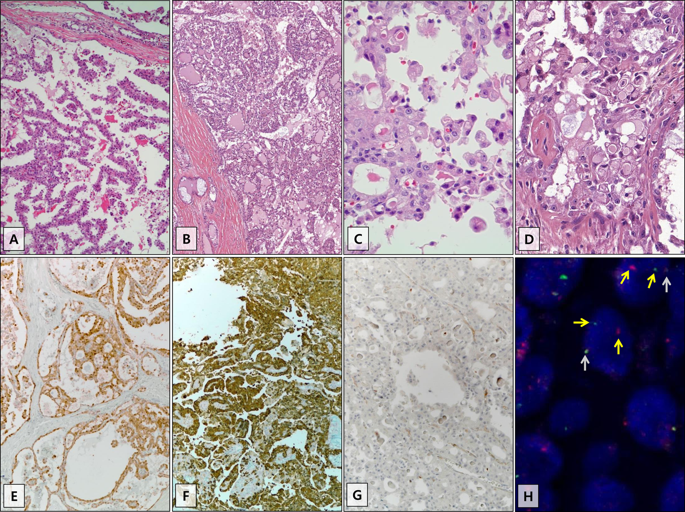Modern Pathology ( IF 7.1 ) Pub Date : 2019-12-10 , DOI: 10.1038/s41379-019-0427-1 Kiyong Na 1, 2 , Juan C Hernandez-Prera 3 , Jae-Yol Lim 4 , Ha Young Woo 1 , Sun Och Yoon 1, 3

|
Secretory carcinoma is a salivary gland tumor with a characteristic chromosomal translocation that results in an ETV6-NTRK3 fusion gene. Secretory carcinoma shows relatively frequent rates of lymph-node metastasis and tumor recurrence and has a characteristic histology. Except for the ETV6 translocation, genomic alterations in secretory carcinoma have not been reported. In the present study, we characterized the novel recurrent genetic mutations of secretory carcinoma. On the basis of histology, immunohistochemistry, and ETV6 gene break-apart fluorescence in situ hybridization assays, 22 tumors were classified as secretory carcinomas (19 ETV6 translocation-positive and 3 ETV6 translocation-negative secretory carcinomas) and their clinicopathologic characteristics were reviewed. Targeted deep sequencing analyses were performed on 20 secretory carcinomas (17 ETV6 translocation-positive and 3 ETV6 translocation-negative secretory carcinomas) to investigate their genetic alterations. The A16V (C→T) mutation in PRSS1, which encodes a cationic trypsinogen and has a mutation associated with hereditary pancreatitis and pancreatic adenocarcinoma, was observed in 40% (8/20) (7/17 of ETV6 translocation-positive and 1/3 of ETV6 translocation-negative secretory carcinomas). Pathogenic variants of MLH1, MUTYH, and STK11 were also identified. Variants of uncertain significance included mutations in KMT5A. These novel characteristic genetic alterations may advance current understandings of secretory carcinoma tumorigenesis and progression, leading to improved diagnoses and treatment strategies.
中文翻译:

唾液腺分泌癌新遗传改变的特征。
分泌性癌是一种唾液腺肿瘤,具有特征性染色体易位,导致ETV6-NTRK3融合基因。分泌性癌显示出相对频繁的淋巴结转移和肿瘤复发率,并且具有特征性的组织学。除ETV6易位外,分泌性癌的基因组改变尚未见报道。在本研究中,我们描述了分泌性癌的新型复发性基因突变。根据组织学、免疫组织化学和ETV6基因断裂荧光原位杂交检测,将22例肿瘤分类为分泌性癌(19例ETV6易位阳性,3例ETV6易位阴性分泌性癌),并对其临床病理特征进行综述。对 20 例分泌性癌(17 例ETV6易位阳性和 3 例ETV6易位阴性分泌性癌)进行靶向深度测序分析,以研究其基因改变。 PRSS1中的 A16V (C→T) 突变编码一种阳离子胰蛋白酶原,具有与遗传性胰腺炎和胰腺腺癌相关的突变,在 40% (8/20) (7/17 的ETV6易位阳性和 1/ 3 ETV6 易位阴性分泌性癌)。还鉴定了MLH1、MUTYH和STK11的致病变异。意义不确定的变异包括KMT5A突变。这些新的特征性遗传改变可能会促进目前对分泌性癌肿瘤发生和进展的理解,从而改进诊断和治疗策略。

































 京公网安备 11010802027423号
京公网安备 11010802027423号